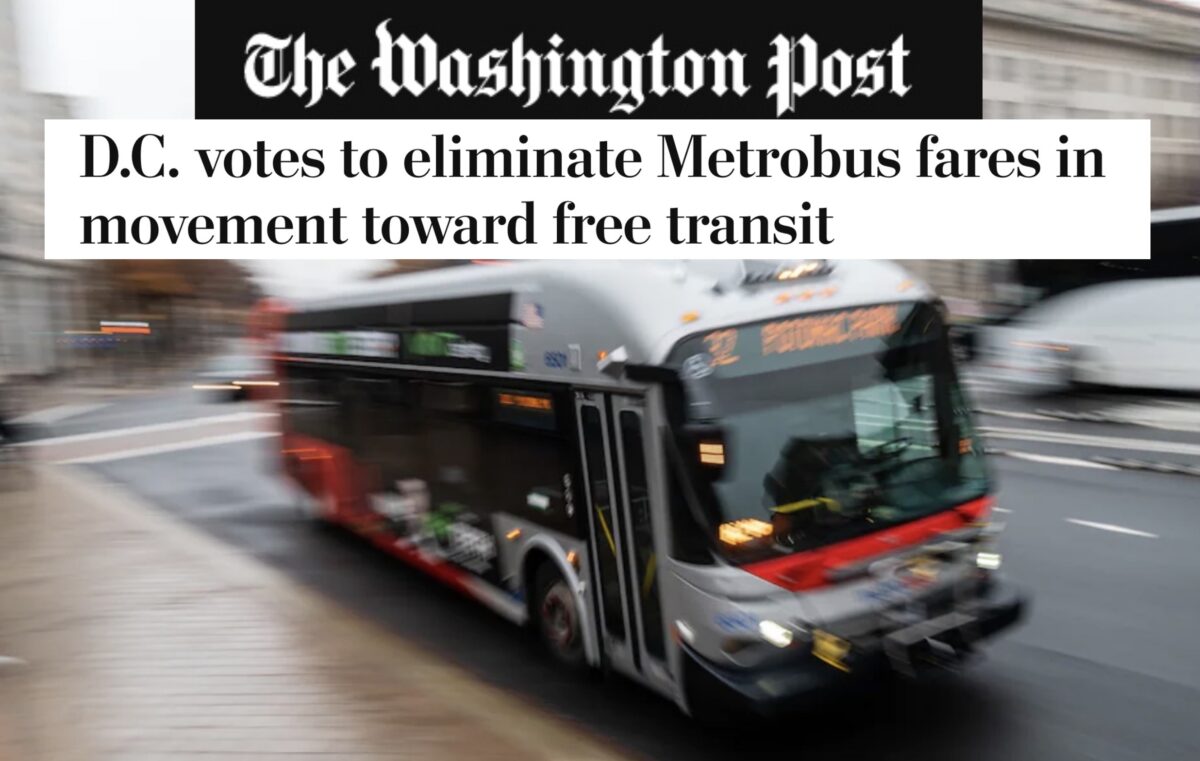On Tuesday night the Washington D.C. city council voted to eliminate fares on its bus service, becoming the largest U.S. to do so. It’s a huge step forward for transit users and should encourage more people to get on the bus at a time when ridership is still in recovery mode following peak pandemic.
Here’s more from the Washington Post:
“The D.C. government will subsidize bus rides within the city limit starting July 1, allowing passengers to board free. The council also expanded bus service round-the-clock on several of the transit system’s busiest routes to help late-night service workers… The cost of the program is estimated at $42 million.”
D.C. is similar in size to Portland (670,000 to our 640,000), but our cities are very different. For starters, D.C. is much more compact and densely developed. But while the culture and landscape differs, much of the political impetus to support free transit should be relatable to Portlanders.
One council member who voted yes said the benefits include, “removing cars from the road and speeding up bus transit” — the exact same goals as the City of Portland’s Rose Lane Project.
In D.C., business leaders have come forward to support the move. One representative of a restaurant lobby group said free transit, “Is really important for the revitalization of downtown, where the pandemic’s effects are being felt every day.”
Portland business leaders have made similar statements about the need for a downtown renaissance, but they have not publicly supported transit — much less advocated to make it free. Unfortunately, some business leaders have strongly opposed projects that increase access to their stores for customers on buses and other non-car vehicles.
For their part, TriMet is headed in the opposite direction. As we reported last month the agency plans to make their first fare increase in a decade. TriMet’s efforts to boost bus service by 30%, announced a few months before the fare increase, appears to be a case of one step forward and two steps back.
In response to TriMet’s fare increase plan, Portlander Mary King wrote an opinion in Street Roots urging TriMet to eliminate them altogether. King said such a plan could be funded by increasing the payroll tax by 1% on high salary earners (starting at $175,000 to $200,000) and up to 2% on people who make at least $350,000 a year. “To get a sense of what these tax scenarios could raise,” King wrote in the op-ed, “[Oregon State] Representative Khanh Pham asked the state Legislative Revenue Office for estimates. They projected that these small increases in the payroll tax would bring in $145 or $165 million in 2023 — depending on the details — and $8 to $10 million more in 2024.”
Portland desperately needs more tools to reduce the amount of car trips. Free — and more widely available — transit is a major step we have to take in order to implement already-adopted environmental and transportation plans. But as local agencies ratchet up efforts to achieve this widely accepted goal, influential voices are using the lack of transit access as a reason to maintain our car-oriented system (“The only option available to people in my district is a car,” is what I’ve heard several local elected official say in recent meetings).
One way to respond to that argument is to make buses more accessible and affordable to everyone.
— Read more about D.C.’s free transit news at WashingtonPost.com.


